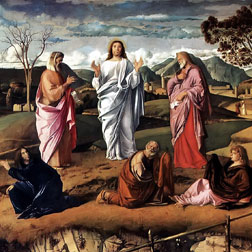Our Lord Jesus Christ’s Testimony of Himself as the Messiah
 by Fr. James B. Buckley, FSSP
by Fr. James B. Buckley, FSSP
(From the August 2009 Newsletter)
Pope Saint Pius X condemned the proposition that “Jesus when He was exercising His ministry did not speak for the purpose of teaching that He is the Messiah…” (Denzinger 2008).
The pope’s condemnation can be verified from an examination of the four Gospels. Besides calling Himself the Son of man, a messianic title, He assented when Caiphas asked if He was “the Christ, the Son of God” (Matt. 26:64), told Pontius Pilate that He was a king but His kingdom was not of this world (John 18:36), and answered the Samaritan woman who spoke of the coming Messiah, “I am He” (John 4:26).
In addition to these well-known examples, there are several others which prove that during His public life Jesus taught that He is the Messiah. First of all, Catholics know that at Cesarea Philippi our Lord asked His apostles, “Whom do you say I am?” Peter replied, “You are the Christ, the Son of the living God.” Approving this answer, Jesus said, “Blessed art thou Simon Bar Jona: Because flesh and blood hath not revealed it to thee, but my Father who is in heaven” (Matt. 16:17).
He teaches the disciples of John the same truth. While their master was in prison, a delegation of them came to Jesus in an effort to find out if He was the Messiah. “Are you the one who is to come,” they asked, “or do we look for another?” Jesus replied, “Go and relate to John what you have heard and seen. The blind see, the lame walk, the lepers are cleansed, the deaf hear…” (Matt. 11:3–6). This answer is evidently an affirmation. What makes it even more striking is that Isaias, after foretelling that “God himself will come to save you,” prophesies: “then shall the eyes of the blind be opened, and the ears of the deaf shall be unstopped. Then shall the lame man leap as a hart and the tongue of the dumb shall be free” (Isaias 35:4–6).
Saint Luke records that after His temptations in the desert our Lord went to the synagogue in Nazareth where on the Sabbath He read from Isaias 61:1: “The Spirit of the Lord is upon me. Wherefore he hath anointed me to preach the gospel to the poor…” He then announced to the congregation: “This day is fulfilled the scripture in your hearing” (Luke 4:21). By these words He implied that He was the Messiah sent by God to evangelize the poor.
In chapter 12 of Saint Matthew’s Gospel, moreover, there are repeated statements in which Jesus all but explicitly declares that He is the Messiah. Referring to Himself, He says: “But I tell you that there is here a greater than the temple.” Speaking again of Himself, He says: “For the Son of man is greater that the Sabbath.” Then, comparing Himself to the prophet Jonas, He proclaims, “Behold a greater than Jonas is here.” And although Solomon was regarded as the wisest of the kings of Israel, Jesus announces: “Behold, a greater than Solomon is here.”
The evidence already presented more than suffices to justify Pope Pius X’s condemnation; nevertheless, I will include a few statements recorded by Saint John which demonstrate that our Lord claimed not only to be the promised Messiah but also God Himself. In one altercation with the Pharisees, for example, He said: “Amen, amen I say to you, before Abraham was made, I am” (John 8:58). At another time He told the unbelieving Jews: “I and the Father are one” (John 10:30). When the apostle Phillip asked Him “show us the Father,” Jesus answered: “Phillip, he that seeth me seeth the Father…Believe you not that I am in the Father and the Father in me?” (John 14:8–10).
Because of our Lord’s sanctity, His own testimony of Himself is a powerful proof that He is, at least, the legate of God. His miracles, His unerring prophecies and the prophecies that He Himself fulfilled provide overwhelming proof that He is, indeed, the Expectation of the nations.
August 26, 2009








